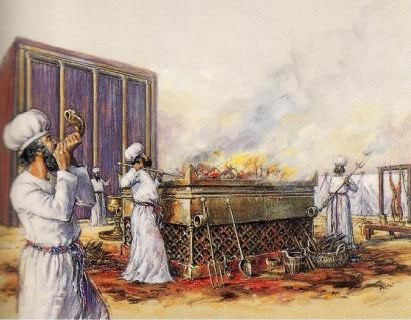A Consuming Fire
See to it that you do not refuse him who speaks. If they did not escape when they refused him who warned them on earth, how much less will we, if we turn away from him who warns us from heaven? At that time his voice shook the Land, but now he has promised, “Once more I will shake not only the Land but also the heavens.” The words “once more” indicate the removing of what can be shaken—that is, created things—so that what cannot be shaken may remain. Therefore, since we are receiving a kingdom that cannot be shaken, let us be thankful, and so worship God acceptably with reverence and awe, for our “God is a consuming fire.” Hebrews 12:25-29
The context of Hebrews is AD70. The destruction of Jerusalem meant that the saints had received the kingdom (Daniel 7).
The writer refers to the destruction of Judaism as a sacrifice – a consuming fire in which the animal is purified and ascends to God in glorious clothes of flame. Divided by the sword of the gospel, Judaism was cut in two (Heb. 4:12) to the joints and the marrow. Following Lev. 1, Christ ascended first as head, then the saints ascended as body, by water (Laver) and fire (Altar). The Altar was a symbolic mountain of God.
“The sight of the glory of the LORD was like a consuming fire on the top of the mountain in the eyes of the children of Israel.” Exodus 24:17
After the saints received the kingdom, rebellious Judah, prefigured by Judas, would be shortly sent by the ascended Christ (speaking from heaven) to destruction. Atonement is always the outworking of Passover. For those who rejected Passover, there was no more sacrifice for sins. They were un-covered before the eyes of the Lord (Gen. 3:10; Luke 23:30; Rev. 6:16).
Then the second angel sounded: And something like a great mountain burning with fire was thrown into the sea, and a third of the sea became blood. Revelation 8:8
For the individual, this ‘division by Covenant’ is completed at death. I don’t believe there will be the same ‘fear’ we experience now. His presence, by His dividing Word, brings death to the flesh. We fall down as dead men and are raised up by His right hand. (In liturgy, this is the confession at the beginning of the worship service).
A believer is covered by Christ’s Passover. My personal Jericho/Atonement finishes the mortification of sin begun in my call from Egypt. The tearing of flesh is again a door to a new Land, and while the traitor is exiled forever to Azal, the disciple eats with Jesus, clothed in ‘consuming fire’, and being like Him, seeing Him as He is (Tabernacles).


























